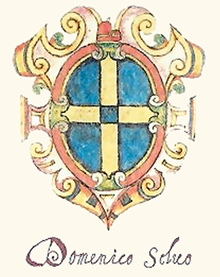| Domenico Selvo | |
|---|---|
| Doge of Venice | |
 Seal of Domenico Selvo | |
| Reign | 1071–1084 |
| Predecessor | Domenico I Contarini |
| Successor | Vitale Faliero |
| Born | Unknown |
| Died | 1087 |
| Burial | |
| Spouse | First wife Theodora Dukaina |
| Issue | by his first wife Domenico Selvo |
Domenico Selvo[1] (died 1087) was the 31st Doge of Venice, serving from 1071 to 1084. During his reign as Doge, his domestic policies, the alliances that he forged, and the battles that the Venetian military won and lost laid the foundations for much of the subsequent foreign and domestic policy of the Republic of Venice. He avoided confrontations with the Byzantine Empire, the Holy Roman Empire, and the Roman Catholic Church at a time in European history when conflict threatened to upset the balance of power. At the same time, he forged new agreements with the major nations that would set up a long period of prosperity for the Republic of Venice. Through his military alliance with the Byzantine Empire, Emperor Alexios I Komnenos awarded Venice economic favors with the declaration of a golden bull that would allow for the development of the republic's international trade over the next few centuries.
Within the city itself, he supervised a longer period of the construction of the modern St Mark's Basilica than any other Doge. The basilica's complex architecture and expensive decorations stand as a testament to the prosperity of Venetian traders during this period. The essentially democratic way in which he not only was elected but also removed from power was part of an important transition of Venetian political philosophy. The overthrow of his rule in 1084 was one of many forced abdications in the early history of the republic that further blurred the lines between the powers of the Doge, the common electorate, and the nobility.
- ^ The correct modern spelling of many of the early Doges is difficult to pinpoint. In some older texts, one might encounter Domenigo Selvo (Hazlitt) or Domenicum Silvium (Sansovino) among a whole host of other spellings, but the most common spelling tends to be Domenico Selvo as can be seen in most of the references for this article, including Norwich and the official website for St Mark's Basilica.